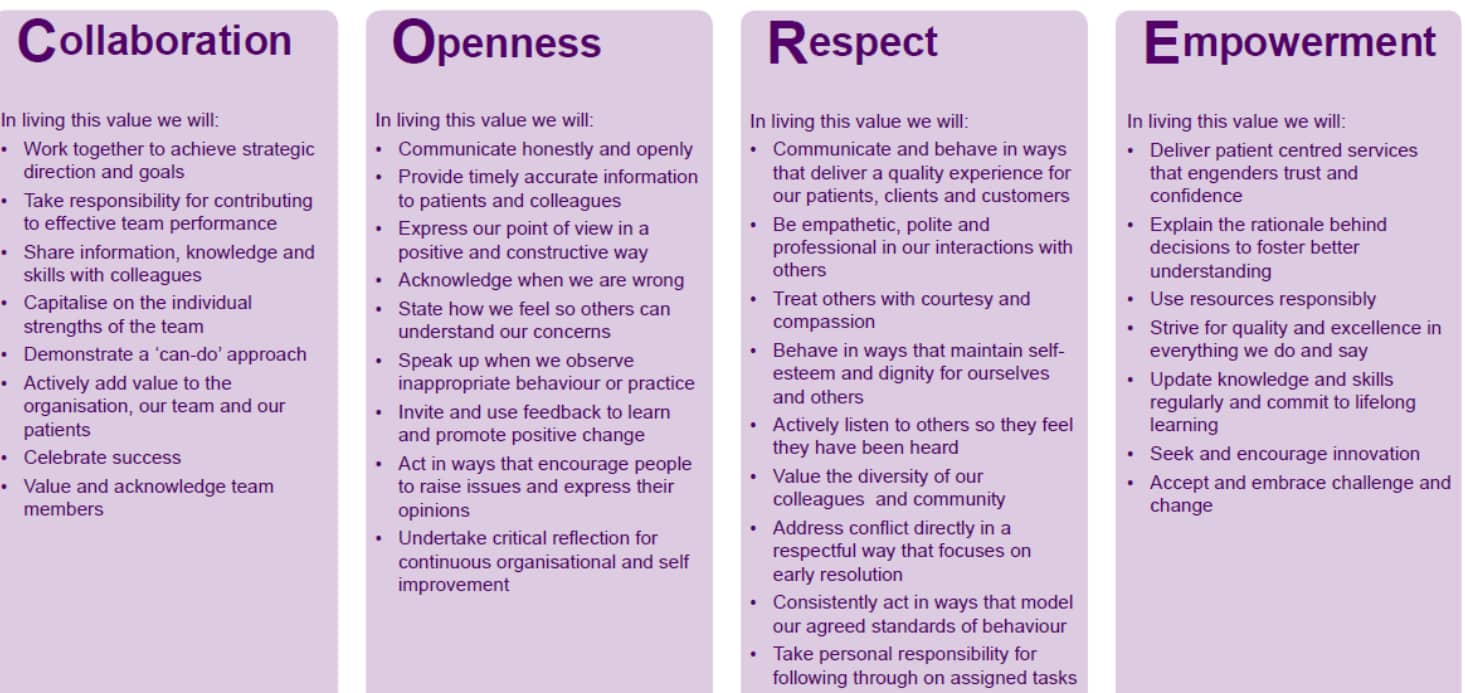Once you have found a NSW Government job to apply for, you’ll need to write your selection criteria document. New South Wales (NSW) Health places a lot of importance on its core values, and a selection criteria question may be based around these values. Our NSW Health selection criteria examples – core values swill help you craft your own examples.
Collaboration, Openness, Respect and Empowerment.
If you are applying for a role with this organisation, one selection criteria you may need to respond to is around how you demonstrate these values. Graduate positions in particular often feature a selection criterion about the organisation’s core values.
For example, the criterion may read something like:
“Demonstrated commitment to person centred care and NSW Health Core Values.”
You may like to use the STAR format to write your response:
Situation: What role were you in?
Task: What challenge were you faced with?
Action: What did you do?
Result: What was the outcome?
How many core values should you address in your response?
You will have 4000 characters (including spaces), or approximately 571 – 1000 words per response, so you will likely be able to include more than one example in your response and address more than one of NSW Health’s values. If you have one very good example, you may find this addresses multiple values at the one time.
The following NSW Health core values selection criteria examples may assist you to formulate your own response, and concisely address the criteria within the 4000-character limit.
NSW Health Selection Criteria Examples – Core Values
Collaboration
During my clinical placement at [Hospital Name], I encountered a challenging case involving a patient with multiple comorbidities requiring specialised care from various healthcare disciplines. I was tasked with coordinating the patient’s care plan, ensuring all healthcare providers were on the same page and working collaboratively to meet the patient’s needs. I initiated a multidisciplinary team meeting that brought together nurses, physicians, physical therapists, and social workers. During the meeting, I facilitated open communication and encouraged each team member to share their insights and expertise. I also organised follow-up meetings to track the patient’s progress and adjust the care plan as needed. The collaborative effort resulted in a comprehensive care plan that addressed the patient’s complex needs effectively. The patient’s condition improved, and they were discharged with a well-coordinated plan for continued care.
Openness
In my previous role at [Previous Workplace], I encountered a medication error that could have had serious consequences for a patient. My task was to address the error promptly and ensure that it was reported and resolved in a transparent and ethical manner. I immediately reported the medication error to my supervisor, providing a detailed account of what had occurred. I also collaborated with the pharmacy team to identify the root cause of the error. I engaged in open and honest discussions with the patient’s family, providing them with all the necessary information and support. The open and transparent approach led to a thorough investigation of the incident, which revealed systemic issues contributing to medication errors. As a result, the hospital implemented new protocols and provided additional training to prevent similar errors in the future. The patient’s family appreciated our honesty and became advocates for patient safety.
Respect
During my clinical rotations, I encountered a patient from a culturally diverse background who had specific dietary and religious preferences that needed to be accommodated in their care. My task was to provide care that respected and honored the patient’s cultural and religious beliefs while delivering high-quality medical care. I engaged in open and respectful communication with the patient and their family to understand their specific needs and preferences. I collaborated with the hospital’s dietary team to ensure that the patient’s dietary restrictions were met, and I coordinated with the hospital chaplain to provide spiritual support. By respecting the patient’s cultural and religious beliefs, we created a care plan that met their physical, emotional, and spiritual needs. The patient and their family expressed gratitude for the culturally sensitive care they received, and their overall experience in the hospital was positive.
Empowerment
As a nurse at [Previous Workplace], I recognised the importance of empowering patients to actively participate in their healthcare decisions. My task was to provide patients with the information and tools they needed to make informed choices about their health. I conducted patient education sessions, explaining medical conditions, treatment options, and potential risks and benefits in a clear and understandable manner. I encouraged patients to ask questions and actively participate in discussions about their care plans. Additionally, I promoted self-management techniques and provided resources for patients to track their progress. Patients who were empowered to take an active role in their healthcare decisions reported greater satisfaction with their care. They felt more confident in managing their conditions and adhering to prescribed treatments. Additionally, the hospital saw a decrease in readmission rates for patients who had participated in empowerment-focused education.
We hope these NSW Health selection criteria examples – core values have been helpful to you. If you require further assistance with your application, please contact us for a quote.



